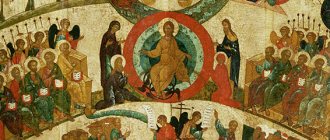As soon as I created a profile on Instagram, my mother immediately said: it’s not a good thing to brag, someone will definitely envy, and then it’s not far from damage. But out of young naivety, I didn’t listen to her, I took pictures and posted pictures from my vacation in Turkey, dance competitions where my children won, bouquets from my husband...
And suddenly our family was replaced - scandals began, illnesses began, and our considerable salary was no longer enough to live on. Well, as there is an evil eye, and maybe even stronger magic! I called my mother and, having repented, gave in: we need a reprimand from the damage, and quickly.
What is a lecture against damage, the evil eye and curses?
Reprimand from damage is a special ritual where prayer texts are used. Their action is aimed at getting rid of evil spirits, negative energy, and the evil eye. The ritual is required if troubles constantly occur in life, health has deteriorated, or relationships with loved ones have suffered.
The reprimand is carried out in church or at home, depending on the severity of the situation. If a person continues to lead a righteous life, the curse will not overtake him again.
Holy water
If you need help to get rid of the evil eye and damage, you need confession and communion. You should order a magpie in three different churches at the same time. You must also ask to read prayers sanctifying the water at least 12 times in a row. You can sprinkle your home and clothes with this water. Every morning, before breakfast and before bed, you need to drink this holy water, taking 3 sips, and think that you will get better soon.
Holy water can be used when cleaning, add to a container of water (200 ml) and wash all the dishes.
There is no need to wipe them, they should dry on their own. Before the bath, you can also drink holy water and add it to the rinse water (200 ml). You need to pour this water over yourself from head to toe and wait until it dries, without using a towel, and only then get dressed. Share:
Who needs chastising with prayers and why?
Reprimand from corruption with Orthodox prayers is used when a person has a powerful negative energy-informational influence, or he is possessed by evil spirits. In the second case, the behavior abruptly changes to aggressive, the sufferer conflicts for no reason, and uses foul language.
Before performing the ritual, it is worth visiting the temple. The priest will determine the presence of a curse or demon possession. Sometimes a person begins to abuse drugs, alcohol, and gamble. This also indicates obsession and corruption.
True faith does not allow the tricks of the evil one. The person himself suffers, he lacks the willpower to give up addictions. They poison life and deprive health. With the help of prayers, a suffering person gains willpower and perseverance.
Signs indicating the need for a report:
- constant poor health;
- depression;
- increased aggressiveness;
- suicidal tendencies;
- lack of plans for the future;
- alcohol or drug abuse.
If pets live at home, they begin to behave restlessly and show aggression towards the one who is damaged.
Perhaps the possessed are simply mentally ill?
Of course, in the 21st century, obsession was recognized as a disease and was even given a name - schizophrenia. People susceptible to this mental disorder often exhibit the same symptoms as cliques or demoniacs. The reasons for the development of schizophrenia include hereditary predisposition, severe mental shock, and sometimes abuse of substances that can disrupt the balance of dopamine.
However, it is impossible to explain why some “schizophrenics” are actually helped by church lectures or rituals to exorcise demons performed by psychics and sorcerers. It seems that “specialists in working with the human soul” (clergy, psychologists and psychiatrists, magicians and witches) talk about the same problem in different terms and practice different methods of solving it.
How to prepare for a reprimand with prayers
In Orthodoxy, it is important that a person sincerely desires to get rid of corruption or demon possession. If the possessed person speaks negatively about Christianity, do not be alarmed. This is normal, because evil spirits speak for him. You should behave kindly with him, and under no circumstances enter into an argument.
Daily prayers will help. The maternal one is considered the strongest. If a suffering person does not have parents, close relatives or those who wish well can pray for him. Their requests for help will be heard from above. One report will not be enough.
Stages of preparation for the ceremony:
- daily petitions from relatives and friends for a suffering person for 1 month;
- observing fasting - giving up alcohol, going to parties, smoking;
- visiting church every Sunday.
After the ritual, a person will feel like a squeezed lemon and will need a long rest. When the condition improves, you should attract him to God and attend a divine service.
Orthodox Life
Archpriest Vladimir Puchkov answers.
Such a phenomenon as exorcism, despite its antiquity, is known today to many even outside the Church, not to mention the believers. Meanwhile, it is difficult to find a more controversial practice in today's church life.
For the Ancient Church, endowed with various gifts, casting out evil spirits was as common and natural as the gifts of healing, prophecy, and speaking in tongues. And in this same connection, according to obvious logic, exorcism should have sunk into oblivion, along with agapes, anaphoras, consisting of unwritten prayers pronounced solely by inspiration from Above and by wandering preachers who bore the name of apostles for many decades after the death of witnesses to the earthly life of Christ , somewhere on the border of the 2nd and 3rd centuries.
However, this is exactly what did not happen. Exorcism has survived glossolalia, church prophets, and inspired miracle workers who healed with the touch of their hands. Love suppers and the apostles, who did not stay in one place for more than three days, remained only in history, and the possessed continued to resort to the help of exorcists. Strict and orderly sequences of anaphoras were formed, the canon of the New Testament was approved, catechetical schools were replaced by theological schools, and the expulsion of unclean spirits, being, in fact, a fragment of the early Christian era, easily fit into the reality of the era of the Ecumenical Councils, and after its end, nowhere from church life nothing happened.
In any case, the prayers known to us “over those suffering from unclean spirits”, placed in the Trebnik, are attributed to St. Basil the Great, which clearly determines that they were compiled no earlier than the second half of the 4th century, if their author is really Basil the Great. If they are only attributed to Saint Basil, but were actually written by someone else, then it can be argued that they appeared even later. Their presence in the modern missal clearly indicates that, despite all the historical vicissitudes, they remain in demand even after one and a half thousand years. And in the Western Church, exorcism existed at almost all times and, as one can assume, still exists today. What is the reason for the, at first glance, completely illogical vitality of the practice, natural for church antiquity and not entirely understandable in the context of modernity?
The first factor, of course, is the phenomenon of obsession itself. On the one hand, it is completely undeniable. We read about demonic possession many times in the Holy Scriptures, we meet it on the pages of the lives of saints and ascetic books. In the end, we meet it in life, in the form of inadequacy that is not amenable to psychiatric diagnosis, especially if such inadequacy is episodic and in one way or another connected with the Church, worship or shrines. On the other hand, there is the difficulty in defining possession, the danger of confusing it with a mental disorder or illness, the likelihood of simulation or simply attributing possession to oneself (or a neighbor) and, as a result, the temptation to write down anything as possession. And then everything follows the everyday logic familiar to us: if there is an illness, there must be a cure. There are certain prayers, and even if reading them does not guarantee the healing of the possessed, then in any case one can hope for the relief of suffering. Since no one else can offer anything else, exorcism remains unrivaled.
The second factor is superstition. The above-mentioned prayers are perceived by many as a panacea, as a means of getting rid of everything in general: from obsession, from illnesses, from life’s problems, adversities and all sorts of demonic intrigues. If in the case of demonic possession, a frightening phenomenon that has not been studied and cannot be overcome by any other means, reprimand “works,” then in relation to problems of illness and intrigue, it will “work” even more so. The understanding, of course, is absolutely alien to the Christian consciousness, but, alas, tenacious both in the church-folk and in the para-church environment. And how can exorcism not be in demand?
Add to this the fact that in the troubled Soviet times, reprimanding from individual practice became widespread. Today, few people remember that initially prayers for those suffering from unclean spirits were compiled to be read by a priest over a specific possessed person one on one. Everyone is accustomed to the fact that reprimands are carried out in front of a large crowd of people, where, in addition to the real demoniacs, the sick, the desperate, the mentally ill, and simply curious may be present. A means of alleviating the suffering of the possessed gradually but surely turns into a universal way to solve all problems. This, of course, does not add any sobriety to exorcism, but it contributes a lot to the popularity of this phenomenon. As a result: the rites, which once arose exclusively thanks to the special gifts of the Spirit and with a very specific goal and are limited in our time by the clear framework of discipline and tradition, in some places turn into an ordinary routine, akin to a health prayer service, the expectations from which exceed even the wildest dreams.
An almost universal lack of understanding of the essence of the phenomenon of obsession plays an important role in this. “To be delivered over to Satan for the destruction of the flesh, so that the spirit may be saved...” (1 Cor 5:5), this is exactly what the Apostle Paul says about demonic possession. It is very important to understand that demonic possession is not a punishment for sins, and certainly not the result of mythical “sorcery.” It is God's permission for the salvation of man. But it is with this understanding that there is a whole problem, including in the Church. Possession fits too easily into the picture of the world that is familiar to many, where God gives out blessings for virtues, severely punishes for sins, and the witches and sorcerers who are responsible for all the troubles can do a little less than everything. Meanwhile, obsession is just one of the means for bringing to the understanding of sometimes an inveterate, incorrigible sinner. Often it is an obvious manifestation of God’s love and care for the salvation of a person mired in sin.
As has already been said, demon possession itself does not guarantee a person’s eternal destruction, and all the torment, suffering and sorrow that it can cause during life have only one goal - the salvation of a person. Therefore, when the prayers known to us are read for a possessed person, this is done not so much to exorcise evil spirits from a person, but to alleviate his suffering, which is inevitable in a state of possession. History knows cases when, for the sake of humility, saints asked for demons. And God did not ignore their requests. So, without a doubt, it is possible to be cured of demonic possession. Including through reading appropriate prayers over the possessed person. But at the same time, you can attend “reports” for weeks and months and not experience the expected result. And this is normal, because if you expect something more for yourself than relief from the torments of obsession, then you will not be able to get anything but disappointment.
The question of the effectiveness of exorcist practices lies entirely in the plane of our faith and to a large extent depends on our understanding of elementary, from the point of view of the Church, things. In the end, God decides whether a person should be possessed or not. Whether a person is a sincere believer and resorts to the prayerful help of the Church with reverence, or clings to superstitions and expects a miracle from following, intended for completely different purposes, is decided and chosen solely by the person himself.
Basic prayers of reprimand
It is better to first pray to the saints to remove damage in the temple. There is more powerful energy there. With a lit candle, they approach the icons and whisper the text. There are no restrictions in turning to higher powers. The main thing is to believe in them.
It doesn't matter the age or status of the questioner. With God everyone is equal. You can also pray at home, but after the first improvements appear. Orthodox texts are read for 40 days, morning and evening. They turn to the Lord, icons, and the Holy Cross.
Prayer to the Honest Cross
Sometimes the devilish force tries to persuade a person to commit sinful acts. Prayer to the Honest Cross helps protect yourself from evil thoughts. It is read in the most difficult moments of life, when fear overcomes, the situation seems hopeless. They ask for help in Church Slavonic. If it is not clear, you can read it in Russian.
Means of expulsion
Reprimands with prayers, as well as various relics, can be used as a means of expelling demons. In a medieval legend, for example, hairs from the beard of St. Vincentia. They were wrapped in a neckerchief. Many tools can be used when performing an exorcism. Words of prayer are just one way. For example, the instrument of exorcism may be the tomb of a saint. Her proximity is believed to make demons flee. Thus, any sacred objects can be used. Although prayer (for example, the prayer of exorcism in Latin) is still the main remedy. Without it, it is difficult to carry out the ritual.










